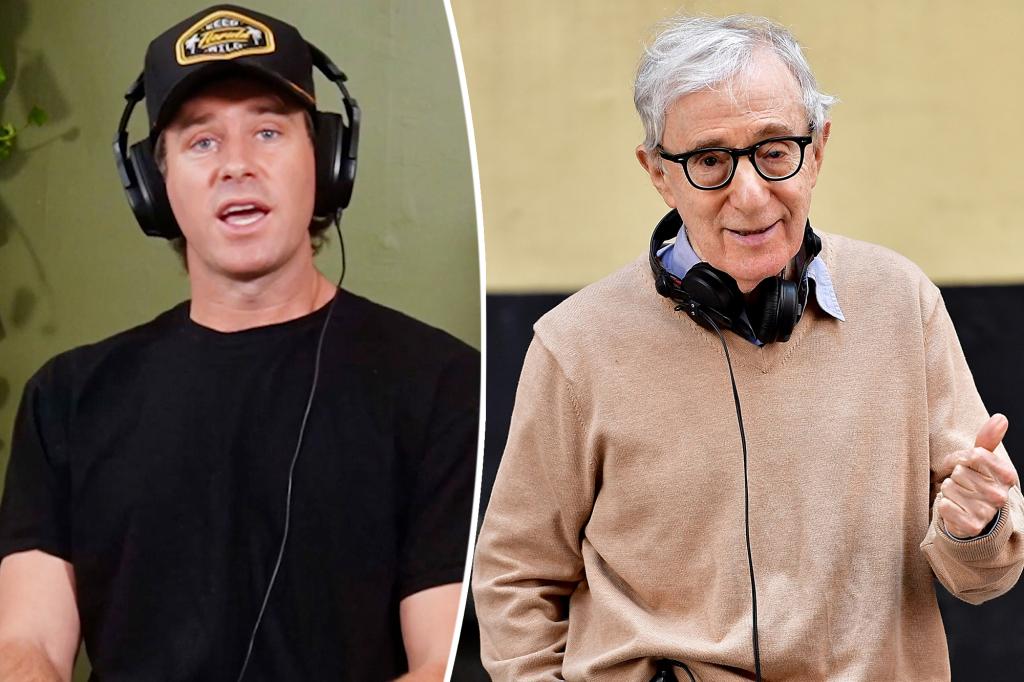Armie Hammer’s Stance on Working with Woody Allen Amid Cancel Culture
In a recent interview on Spotify’s "The Louis Theroux Podcast," Armie Hammer expressed a nuanced and conflicted perspective on the idea of collaborating with the controversial filmmaker Woody Allen. When asked if he would accept a role in one of Allen’s upcoming projects, Hammer hesitated, framing the question as a "trick" with no clear right answer. He emphasized his reluctance to participate in what he perceives as the broader phenomenon of "cancel culture," which he believes can unfairly demonize individuals without due process. Hammer suggested that if he were to decline working with Allen solely based on public accusations, it would imply his endorsement of a system that hastily cancels people without thorough understanding or dialogue. Instead, he proposed a more personalized approach: engaging in direct conversation with Allen to form his own opinion before making a decision.
Hammer, who has faced his own share of public scrutiny and professional setbacks due to personal scandals, drew parallels between his experiences and Allen’s. "Being someone who had the world say a bunch of stuff about me that I knew wasn’t true, I’d go, ‘Oof, I get what that feels like. That sucks. All right, yeah, let’s do it," he remarked. However, he also acknowledged the complexity of the situation, stating that if his conversation with Allen left him with a negative impression or lingering doubts, he would refrain from collaborating with the director. This approach reflects Hammer’s desire to balance empathy and fairness with accountability, avoiding hasty judgments based solely on public opinion.
The Controversy Surrounding Woody Allen
Woody Allen, the renowned filmmaker behind classics like "Manhattan" and "Annie Hall," has been embroiled in a decades-long scandal involving accusations of sexual abuse. The allegations, which Allen has consistently denied, were first made public in 1992 by Dylan Farrow, the adopted daughter of his ex-partner Mia Farrow. Dylan alleged that Allen molested her when she was just seven years old, a claim that surfaced amidst a contentious breakup between Allen and Mia, during which Allen began a relationship with Mia’s other adopted daughter, Soon-Yi Previn, whom he later married. Allen has maintained that Mia fabricated the allegations as an act of revenge, and no criminal charges were ever filed against him.
The scandal resurfaced in 2017 during the height of the #MeToo movement, when Dylan published an op-ed questioning why Allen had largely escaped the professional repercussions faced by other figures like Harvey Weinstein. This renewed attention led several actors and industry professionals who had previously worked with Allen to publicly express regret and pledge to never collaborate with him again. The controversy remains deeply divisive, with some continuing to support Allen’s career while others advocate for his complete professional ostracization.
Armie Hammer’s Own Experiences with Public Scrutiny
Armie Hammer’s thoughts on Woody Allen are likely influenced by his own history of facing intense public backlash. In 2021, Hammer’s career came to a near-halt after he was accused of physical and sexual abuse by multiple women, including a woman named Effie, who alleged he had "violently" raped and emotionally abused her. Additionally, Hammer faced bizarre accusations of harboring cannibalistic fantasies, based on leaked messages that he allegedly sent. While Hammer has denied all these allegations, the fallout led to the end of his marriage to Elizabeth Chambers and his temporary blacklisting in Hollywood. However, despite these challenges, Hammer has begun to rebuild his career, recently appearing in a podcast and securing new film roles, indicating that public opinion and industry opportunities can shift over time.
The Resurgence of Armie Hammer’s Career
In the same podcast interview, Hammer shared updates about his professional resurgence, revealing that he has several projects lined up for the coming months. He mentioned having just completed filming "Frontier Crucible" alongside Thomas Jane and William H. Macy, with additional movies and a TV show in the pipeline. Hammer even joked about the volume of offers he’s receiving, admitting he’s now in the position of having to turn down jobs. This turnaround underscores the dynamic nature of public perception and the entertainment industry’s tendency to offer second chances, even to those who have faced significant personal and professional crises.
A Reflective Conclusion on Accountability and Empathy
The interplay between personal redemption, public perception, and professional opportunities is a recurring theme in both Woody Allen and Armie Hammer’s stories. While Hammer’s willingness to consider working with Allen may be seen as a statement against cancel culture, it also highlights the complexity of navigating accusations and accountability. Both men have faced severe public backlash, yet their careers continue to evolve, raising questions about how society balances empathy with justice, and how individuals can grow and change in the face of adversity. As Hammer’s own story demonstrates, the consequences of allegations can be profound, but they do not always preclude the possibility of redemption or renewed success. For those affected by similar issues, resources like the Sexual Assault Hotline (1-800-330-0226) offer support and guidance in navigating complex and challenging situations.












